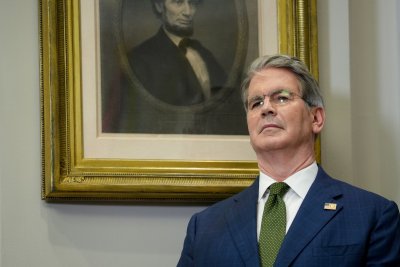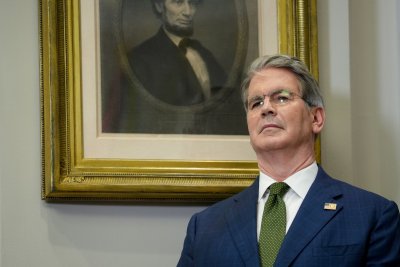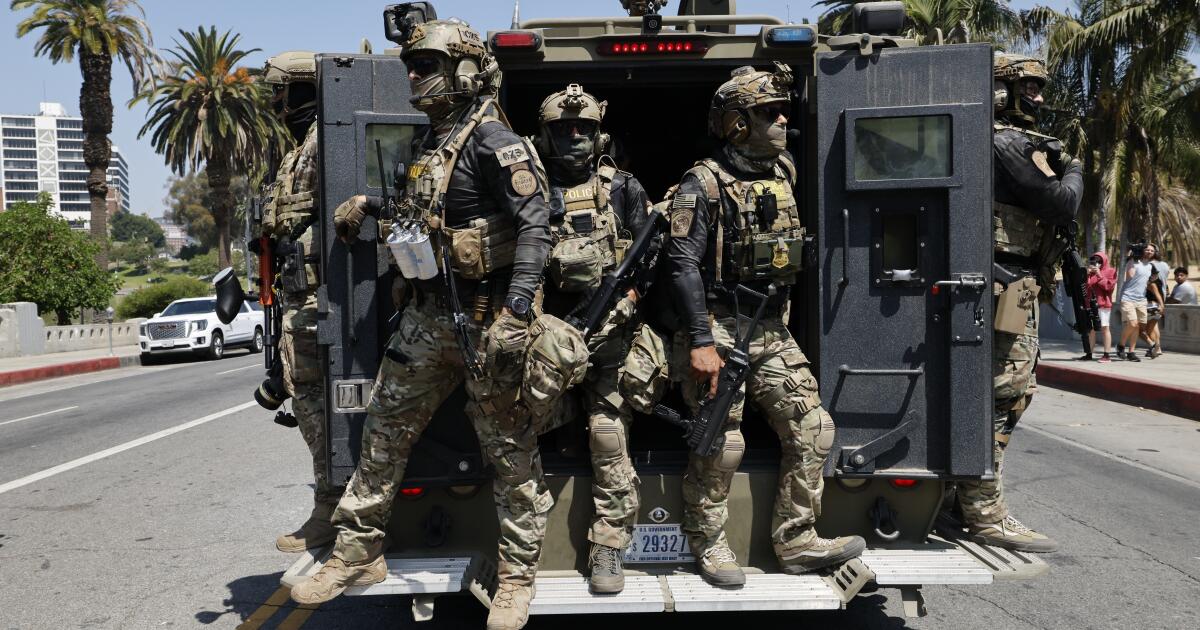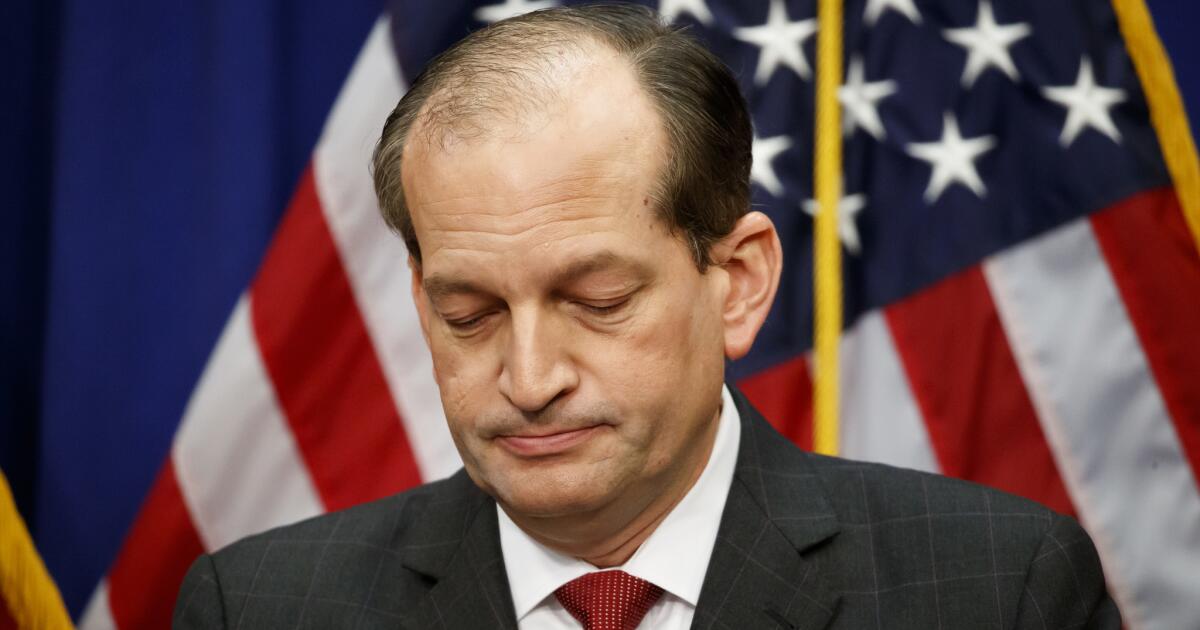Reporting from Washington — Embattled Secretary of Labor R. Alexander Acosta announced his resignation Friday amid mounting criticism of a lenient plea deal he struck with a now-convicted sex offender while Acosta was a federal prosecutor in Florida.
Acosta’s departure, which takes effect next week, means acting secretaries will head four major federal departments. He is the 11th Cabinet official to quit or be forced out, several under ethical or legal clouds, since President Trump took office.
Trump told reporters that Acosta had called him Friday morning to resign, adding, “It’s his decision.” Acosta said he wanted to avoid becoming a distraction to the administration so it could focus on the economy.
The resignation came two days after Acosta held a news conference to try to save his job by defending the plea agreement he negotiated in 2008 with Jeffrey Epstein, a wealthy financier, when Acosta served as U.S. attorney in Miami.
The news conference was aimed in part at persuading a president who is happy to gin up his own controversies but tends to resent bad publicity caused by underlings. Acosta’s effort to absolve himself of responsibility failed after prosecutors in Florida publicly challenged his account.
On Friday, Trump praised Acosta but did not say he had tried to persuade him to stay.
“I do not think it is right and fair for this administration’s Labor Department to have Epstein as its focus,” Acosta said as he stood beside Trump at the White House before the president departed for a trip to Wisconsin and Ohio for fundraising events and a speech.
Trump seemed less concerned.
“Alex believes that. I’m willing to live with anything,” he said. “Alex felt that way.
“He was a great student at Harvard. He’s Hispanic, which I so admire, because maybe it was a little tougher for him and maybe not,” Trump added. “That’s what I know about him. I know one thing — he did a great job.”
Acosta added that “Cabinet positions are temporary trusts,” a fact that is especially notable in Trump’s White House, which has struggled with record turnover.
Acosta’s departure means Patrick Pizzella, the deputy secretary of Labor, will serve as acting secretary. Pizzella’s career also is tinged by controversy.
A former lobbyist, Pizzella was involved in an effort in the late 1990s and early 2000s to prevent the Northern Mariana Islands, a U.S. commonwealth in the Western Pacific, from adopting federal minimum wage laws.
Pizzella worked on the project with Jack Abramoff, an influential lobbyist who later was sentenced to six years in prison for charges related to fraud.
The issue dogged Pizzella during his Senate confirmation hearings for deputy secretary in July 2017.
“One of the key issues you lobbied on was to block bipartisan legislation for basic worker protections in the Northern Mariana Islands, where garment manufacturers could produce clothing labeled made in the USA without having to comply with U.S. minimum wage laws,” then-Sen. Al Franken (D-Minn.) said.
The Leadership Conference on Civil and Human Rights, an umbrella group of 200 activist organizations, later accused Pizzella of working to advocate policies “that essentially allowed for unchecked slave labor to be performed.”
Pizzella was confirmed by the Senate, 50-48.
Acosta’s downfall stems from his role in the prosecution of Epstein, a once-powerful financier who socialized with Donald Trump before he became president and Bill Clinton after he left the White House.
Epstein was charged in 2008 with luring underage girls to his Palm Beach, Fla., mansion for sex.
Under the plea agreement with Acosta’s office, Epstein avoided a federal trial — where, if convicted, he could have faced a potential sentence of life in prison — and pleaded guilty instead to two state felony solicitation charges.
He served 13 months in a county jail but was allowed to go to his office six days a week on a work release program.
In February, a judge ruled that the deal was improper because Acosta did not tell victims about the arrangement. The Justice Department subsequently opened an investigation into Acosta’s handling of the case.
Acosta has denied any wrongdoing, but the deal gave rise to a growing chorus of complaints in the #MeToo era that a sexual predator was granted favorable treatment because of his vast wealth and high-powered social connections.
The controversy reignited last weekend when federal prosecutors in New York charged Epstein with bringing underage girls to his opulent Manhattan townhouse and abusing them. He has pleaded not guilty.
Trump’s own ties to Epstein made the episode increasingly awkward for the White House.
Although Trump has tried to distance himself from his former friend, in a 2002 interview with New York magazine, he called Epstein a “terrific guy” and “a lot of fun to be with” while noting that “it is even said that he likes beautiful women as much as I do, and many of them are on the younger side.”
On Friday,Trump reiterated that he had a falling out with Epstein some years ago and that he is “not a fan.” He did not disclose the nature of their dispute.
Acosta had run afoul of the White House before Epstein’s legal problems reemerged. Some of Trump’s advisors had complained that Acosta failed to aggressively pursue deregulation and other pro-business initiatives the president favored.
Before he joined the Trump administration, Acosta served on the National Labor Relations Board and in the Justice Department’s civil rights division under President George W. Bush.
He later was a well-respected dean of Florida International University, a public university in Miami. Much of his role in the Epstein case was known publicly when Trump selected him.
But unlike other presidents who have broad connections in government, Trump came to office as an outsider and relied on the judgment of others to fill out his staff. Vetting in many cases appeared cursory at best.
Acosta said Friday that he had never met or spoken with Trump when he came for an interview in early 2017 and was offered the job.
Like many others who have come into Trump’s orbit, he leaves as a damaged figure.
No modern president has lost as many Cabinet officials or senior advisors in his entire first term as Trump has in his first 30 months, according to records maintained by Kathryn Dunn Tenpas for the Brookings Institution, a nonpartisan think tank.
“No matter how you slice the data, the turnover is off the charts,” Tenpas said.
“It handicaps a president’s capacity to enhance his agenda or fulfill his campaign promises,” she added.
In all, eight secretaries who have left permanent Cabinet posts have done so under pressure or protest.
Only one moved to another administration job. That was John F. Kelly, who left as secretary of Homeland Security to become White House chief of staff. Kelly left the latter post in January after multiple disputes with Trump, and his replacement, Mick Mulvaney, is still in an acting capacity.
Three other Cabinet officials who do not head permanent Cabinet departments also left — one under pressure and two voluntarily.
Trump has said he likes the flexibility of having officials serve in an acting capacity, and his propensity to replace people has prompted those aides to work especially hard to stay in his good graces, flattering the president often in public.
That was on display Thursday when Trump held a Rose Garden event to announce an embarrassing retreat — he was giving up his fight to add a citizenship question on the U.S. census after being rebuffed by the Supreme Court.
Rather than admit defeat, Atty. Gen. William Barr praised Trump repeatedly. “Congratulations again, Mr. President,” he said.
The constant speculation about which of Trump’s aides will be next to fall — published reports Friday suggested Direction of National Intelligence Dan Coats may be on the edge — has distracted from the White House agenda.
“It means that people are focusing not on the mission of the organization, but they’re focusing on the water cooler chat about who’s going to be their boss and who’s going to be sticking around,” said Max Stier, chief executive of Partnership for Public Service, a nonpartisan nonprofit group focused on making government work better.
When top government advisors leave or face uncertain futures, their subordinates are also at risk of replacement, creating instability throughout the agency.
Trump’s picks have been surrounded by more controversy in part because he often selects them hastily, announcing appointments before they have been vetted.



